#Profit on Existing Mortgages
Explore tagged Tumblr posts
Text
I Hate How She Talks About Snow White

"People are making these jokes about ours being the PC Snow White, where it's like, yeah, it is − because it needed that. It's an 85-year-old cartoon, and our version is a refreshing story about a young woman who has a function beyond 'Someday My Prince Will Come. "

Let me tell you a little something's about that "85-year-old cartoon," miss Zegler.
It was the first-ever cel-animated feature-length full-color film. Ever. Ever. EVER. I'm worried that you're not hearing me. This movie was Disney inventing the modern animated film. Spirited Away, Into the Spider-Verse, Tangled, you don't get to have any of these without Snow White and the Seven Dwarfs (1937.)
Speaking of what you wouldn't get without this movie, it includes anime as a genre. Not just in technique (because again, nobody animated more than shorts before this movie) but in style and story. Anime, as it is now, wouldn't exist without Osamu Tezuka, "The God of Manga," who wouldn't have pioneered anime storytelling in the 1940s without having watched and learned from Snow White and the Seven Dwarfs in the 1930s. No "weeb" culture, no Princess Mononoke, no DragonBall Z, no My Hero Academia, no Demonslayer, and no Naruto without this "85-year-old cartoon."
It was praised, not just for its technical marvels, not just for its synchronized craft of sound and action, but primarily and enduringly because people felt like the characters were real. They felt more like they were watching something true to life than they did watching silent, live-action films with real actors and actresses. They couldn't believe that an animated character could make kids wet their pants as she flees, frightened, through the forest, or grown adults cry with grieving Dwarves. Consistently.
Walt Disney Studios was built on this movie. No no; you're not understanding me. Literally, the studio in Burbank, out of which has come legends of this craft of animated filmmaking, was literally built on the incredible, odds-defying, record-breaking profits of just Snow White and the Seven Dwarfs, specifically.
Speaking of record-breaking profits, this movie is the highest-grossing animated film in history. Still. TO THIS DAY. And it was made during the Great Depression.
In fact, it made four times as much money than any other film, in any other genre, released during that time period. It was actually THE highest-grossing film of all time, in any genre, until nothing less than Gone With the Wind, herself, came along to take the throne.
It was the first-ever animated movie to be selected for the National Film Registry. Actually, it was one of the first movies, period, to ever go into the registry at all. You know what else is in the NFR? The original West Side Story, the remake of which is responsible for Rachel Ziegler's widespread fame.
Walt Disney sacrificed for this movie to be invented. Literally, he took out a mortgage on his house and screened the movie to banks for loans to finish paying for it, because everyone from the media to his own wife and brother told him he was crazy to make this movie. And you want to tell me it's just an 85-year-old cartoon that needs the most meaningless of updates, with your tender 8 years in the business?
Speaking of sacrifice, this movie employed over 750 people, and they worked immeasurable hours of overtime, and invented--literally invented--so many new techniques that are still used in filmmaking today, that Walt Disney, in a move that NO OTHER STUDIO IN HOLLYWOOD was doing in the 30's, put this in the opening credits: "My sincere appreciation to the members of my staff whose loyalty and creative endeavor made possible this production." Not the end credits, like movies love to do today as a virtue-signal. The opening credits.
It's legacy endures. Your little "85-year-old cartoon" sold more than 1 million DVD copies upon re-release. Just on its first day. The Beatles quoted Snow White in one of their songs. Legacy directors call it "the greatest film ever made." Everything from Rolling Stones to the American Film Institute call this move one of the most influential masterpieces of our culture. This movie doesn't need anything from anybody. This movie is a cultural juggernaut for America. It's a staple in the art of filmmaking--and art, in general. It is the foundation of the Walt Disney Company, of modern children's media in the West, and of modern adaptations of classical fairy tales in the West. When you think only in the base, low, mean terms of "race" and "progressivism" you start taking things that are actually worlds-away from being in your league to judge, and you relegate them to silly ignorant phrases like "85-year-old cartoon" to explain why what you're doing is somehow better.
Sit down and be humble. Who the heck are you?
#Snow White#Snow White and the seven dwarfs#snow#snow white 1937#snow white and the seven dwarfs 1937#Snow White 2024#Rachel zegler#west side story#poc#Disney#live action Disney hate#animation history#Do not go see this movie. Do not stream this movie.#Anime#anime history
5K notes
·
View notes
Text
They are trying to illegally fire tens of thousands of Federal workers at the worst possible time of year. These are middle class to lower middle class people in DC and probably about a third or so of them voted for Trump. Contrary to publican opinion nobody gets rich working for the Federal government, especially in a major city where the cost of living is very high as are mortgages and rents. A disproportionate number of them are African-American, women, and other marginalized people since government employment is a safe haven for them with the added safety of being largely Unionized. To be honest there aren’t a lot of jobs open in the DC area with the pay and benefits of a unionized government job.
Musk is trying to run the government as if it were a business and that model does not apply. Government is not supposed to make a profit or pay dividends to shareholders. The primary purpose of government is to SPEND money to improve the lives and safety of all Americans.
Mass firings will not only ruin the lives of those removed from employment but it will have a ripple effect throughout the greater DC, Virginia, and Maryland area. All retail outlets will suffer immediately from lost business. Community and social services will be strained to the breaking point by hordes of people becoming unemployed all at once. The housing and rental market will collapse. Banks and Credit Unions will be stressed by loss of revenue. Families will dissolve and suicides will increase and so on. For those of you who don’t have sympathy for Federal employees, wait until the inconvenience of having almost no government services available to you strikes home. Think of the benefits that will be cut off. Think of the aid you won’t be able to receive when something goes wrong in your. Wait until you try to call a government agency to correct something to find out it doesn’t exist or is run by a skeleton crew.
You can look up the salaries of the rank and file workers and see it’s not great especially for one of the priciest markets in the country. This is a cold and heartless move which will have a devastating impact on large numbers of real people. It won’t just be in DC because they plan on spreading to field offices around the country so the pain will begin to seep into every county in the nation.
Government is not as simplistic as a business and can’t be run like one or by business people, entrepreneurs, oligarchs, CEO’s etc. Republicans, and other thoughtless people, need to separate themselves from the notion that someone who runs a business can run a country, or even a government agency. Diplomacy for example is much more complicated than a simple business deal. Diplomats spend lifetimes working on treaties and international agreements that will be in effect for decades or even centuries. It takes detailed knowledge of the past, current demographics and their needs, and years of forethought to play out every possible outcome of a treaty. Each word and phrase is excruciatingly analyzed for months or even years to achieve the desired effect and avoid any misinterpretations, misunderstandings, or vagaries of translation.
Treaties and national policy can’t be rationally drawn up by amateurs over a drunken round of golf, or a drunken steak dinner, or an amateurish conference call with the complexities of foreign languages which required highly skilled diplomatic translators who know the particularities of not only the mother tongue but each regional accent and dialect to avoid any posssible faux pas.
Trump and his henchmen are arrogant, poorly educated, unqualified, and often inebriated bigots and racists trying to run the world’s largest and most complex governing body as if it were a chain restaurant franchise.
Have you noticed yet nobody is talking about cutting aid to big energy companies, airlines, big pharma, or virtually any big corporate enterprise. Felon Muskrat says he’s uncovered billions in corruption and waste at every federal agency, in only a week. Felon hasn’t offered one scrap of documentation or proof though and neither had Trump. The media reports their claims of billions in waste and the Republican voters accept it as true. After a few weeks of hearing it in the news many of you will accept the lie as truth simply because you’ve heard it so often.
They are deliberately trying to overwhelm you, distract you, and wear you out. Democratic lawmakers trying to enter the very Federal agencies they fund have been locked out and kept at bay by armed private security wearing no identification and unwilling to state their names. Unwilling to say anything except you can’t enter.
They are pushing back but most of you seem to have forgotten that they became the minority party in both houses of Congress and the minority doesn’t have the ability to win a vote and pass anything or do anything other than protest and try to delay. Fortunately majority labor unions are out protesting in front of all the major agencies being targeted so far. Protests are also happing in some big cities but you’d never know it because it is virtually ignored as always by tv news.
#USAID#dismantling American government#this only benefits oligarchs and foreign adversaries#causing widespread unemployment and lack of services#republican assholes#maga morons#crooked donald#traitor trump#Felon Musk#republican family values
79 notes
·
View notes
Text
Many businesses went out of business because of COVID.
Many people use this as evidence that the shutdowns and restrictions were the wrong choice, and that all businesses should have been allowed to operate at full capacity with no restrictions.
That wouldn't have worked, because businesses would still have had to close if too many customers chose to stay home or if all of their workers quit, went on strike, or got COVID.
But besides that, why would they go out of business from having to close for a few months? Why can't they just pause their operation for a few months then pick up where they left off when it's over? Closing means no profit, but it also means no operating costs.
Could it be because they still have bills that exist even if they're closed, like rent?
If that's the case, then the entire problem is that the profits of corporate landlords are being prioritized over everything else. If you're angry, direct your anger there.
Similarly, if you're angry about all the taxpayer money being spent on stimulus checks, there's another solution to that too. We could have just cancelled rent payments and postponed mortgage payments. That would have costed zero taxpayer money. But again, profits of banks and landlords were prioritized. While the working class lost their source of income, the owning class got to keep theirs.
138 notes
·
View notes
Text

When a company decides they want to take their business venture forward and have it publicly traded, the Securities and Exchange commission (SEC) mandates the heads or owner of the company file a S-4 registration statement. This gives possible investors a background on the owners of the stock in questions past business dealings. Did they exceed expectations for growth in their previous companies? Was there any litigation or leans? What were the profit margins? This enables investors to make an educated and thoughtful decision before investing.
Since the 80’s it has been Trump’s priority to portray wealth. The golden decor, the foreign model wife, huge 747s with his name plastered on them, his name plastered on buildings, hotels and skyscrapers worldwide. This giving the illusion of success. What’s lesser known is often the buildings that bare his name do not belong to him nor are they financially affiliated with him. Some are. Some are just a marketing stunt that the name, Trump, brings luxury to, or used to, mind.
When the idea of making Truth Social a publicly traded company was introduced it was mandated that a S-4 registration statement be made public before the SPAC, Digital World Acquisition Corp could move forward with the merger of Truth Social and Technology Group Corp. it reads as follows.
Entities associated with President Trump have filed for bankruptcy protection. The Trump Taj Mahal, which was built and owned by President Trump, filed for chapter 11 bankruptcy in 1991. The Trump plaza, the Trump Castle, The Plaza Hotel, all owned by President Trump at the time, filed for chapter 11 bankruptcy in 1992. THCR, which was founded by President Trump in 1995, filed for chapter 11 bankruptcy in 2004. Trump Entertainment Resorts, Inc, the new name given to Trump Hotels and Casino Resort after its 2004 bankruptcy, declared bankruptcy in 2009. While all the forgoing were different businesses than TMTG, there can be no guarantee that TMTG’s performance will exceed the performance of those entities.
It continues,
Trump Shuttle, Inc, launched by president Trump in 1989, defaulted on its loans in 1990 and ceased to exist by 1992. Trump University, founded by President Trump in 2005, ceased operations in 2011 amid lawsuits and investigations regarding the company’s business practices. Trump vodka, a brand of vodka produced by Drinks Americas under license from the Trump Organization, was introduced in 2005 and discontinued in 2011. Trump Mortgage,LLC a financial services company founded by President Trump in 2006, ceased operations in 2007. GoTrump.com, a travel site founded by President Trump in 2006, ceased operations in 2007. Trump Steaks, a brand of steak and other meats founded by President Trump in 2007, discontinued sales two months after its launch. While all these businesses were in different industries than TMTG, there can be no guarantee that TMTG’s performance will exceed the performance of these entities.
I couldn’t have said it better myself. It’s all a lie. An illusion. Smoke and mirrors. The fortune Trump’s father left to him, Trump squandered quicker than he could recover, leading to a lifetime of shady deals, loans from foreign banks, failed get rich schemes and grifting.
Oh my the grift is strong in that one. From digital trading cards, NFT’s, ugly sneakers, bobble head dolls, $100k watches, madeIn china, sold from a strip mall in Wyoming, there’s ornaments, a $60 Bible, also made in china for $4, where the gold edged pages stick together, heck! He’ll even sell you a piece of the suit he was wearing when he was shot at in PA.
Another financial stronghold of Trump is to simply screw over people. Whether it’s not paying contractors who worked on his properties, not paying employees at his hotels, confiscating their tips as well, suing models who worked at his agencies for defamation, a charity, The Trump Foundation, was found guilty of fraud, stealing from those in need to line his pockets, or trying to cut out the very people who created his TMTG company in the first place. Trump doesn’t seem to care who he stiffs, as long as it benefits him.
The new and most lucrative venture is campaign donations. Whether it’s billionaire oligarchs who are buying favor, or little old Mr and Mrs MAGAdonia, Trump will happily take your money.
Lord knows he needs it. Between owning his rape victim 90 some million dollars and counting. The over half a billion dollars he scammed from New York he has to pay back. The hundreds of millions of dollars in lawyer fees. Not to mention upcoming cases and his lavish lifestyle. Things might get tight.
As you can see it’s a fake. A failed businessman who couldn’t just take the money his father left him and sit on an investment. He wanted fame. He wanted power.
After a lifetime of pursuing fame and power, a lifetime of fraud, cheating, grifting, ripping people off, and skirting the system has come back to haunt him. Accountability is knocking. Eventually it will kick in the door.
#election 2024#traitor trump#politics#kamala harris#vote blue#donald trump#republicans#news#the left#gop#american people#america#independents#harris waltz#trump24#harris walz 2024#trump is a threat to democracy#trump 2024#money#maga 2024#maga cult#trump vance 2024#vote kamala#vote vote vote#women voters#liberty#love#joy#democracy#declaration of independence
27 notes
·
View notes
Note
You do know that FBBC are still heavily producing and distributing beer, right? Before you start patting yourself on the back that the original brewery/land is being sold, you might want to get clued into the fact that distribution has been expanded to San Antonio and recently to Houston. The company and brand are positioning themselves to expand further. Don't think they will go back to the cute craft brewery, but as you have pointed out, craft breweries are not that profitable. Looks like they are going for a stronger business model.
You go on about the whole YANA thing. I have never understood why a select few in the fandom actually became jealous about a charity? Seems so small minded and petty. Regardless, YANA still exists and continues to do good things.
Yes I know about their distribution, I'm the one who pointed out 5 years ago all those bottling and canning equipment and the end products weren't for the taproom customers but meant for distribution because the Ackles were trying to go big because they want to make actual profit despite originally claiming that they would only sell beer at the brewery (X).
What did you think the $1000 membership package was about? To get SPN fans to regularly go to FBBC to keep it afloat so they can keep making beer on site and then ship off site. Quite a turnaround when Gino cast dispersion toward SPN fans and said there will be no beer named after a "corny tv show" (X)
According to Gino, they plan to resume producing their own beer again once they find a location in Austin.

After they bought these top on the line brewing equipment and are now selling. That sounds like a "stronger business model" to you?

Surely you don't think the Ackles are going to sell off all the brewery equipment only to turn around and buy new equipment for the alleged 2nd location? At best they should just open a small scale taproom and put Gino in there as the glorified bar tender.
Do you know people who had their beer made by somebody else? I have. They have to pay for everything, or make compromises. There is no in between. A specific yeast strain the contractors don't use? Then you're going to have to pay for that, and the labor to keep it going, or do it yourself. Oh wait, they can't because they closed down FBBC.
Breweries don't close because they'll make more money from contract breweries, if that's the case then why open your own brewery in the first place?
Let me break it down using another real life example:
If parents have a couple of kids going to the same college and overlap each other, instead of paying dorm fees or renting an apartment, they would buy a townhouse for their child/ren and rent out rooms to other students, which pays for the mortgage. Then when the last child graduates, they sell the house for a profit.
See the difference between owning a brewery that doubles as a contract brewery (your house) vs paying everything to a contract brewery (college)?
What's going on is there is a saturation of craft breweries. It's like in the late 90s when there was a huge surge in openings of comic shops. Every collector dreamed of running his own place and thought a love for the product was enough to be successful. The market became saturated. A couple years later, the trend reversed and it seemed another shop was closing every other week. The difference in making it or not largely rested on whether the owner had the skill set to run a business. Foresight. Customer relations. General business principles. And of course, the ones who had adequate funding. The market decided who made it and who didn’t.
That's what is going on in the current beer industry. The hobbyists who thought they could be successful because they loved brewing but lacked the skill set to run a business are beginning to fall.
LOL nobody is jealous of YANA, people continue to be amused by it because of how badly it was executed and then failed. If YANA still exist and continues to do good thing, it's only because Jared bailed it out after both Misha and Jensen abandoned the public promise as mentioned here and here.
I remember back in my day a craft beer was “hey there’s a beer that’s $3.50 a bottle instead of $2 and it’s way better!”
Nowadays it’s “this craft beer is sourced with water collected from the Himalayas by free range howler monkeys and filtered through the wings of butterflies. Oh and we can’t bother to be original so it’s an IPA loaded with hops. $8 please”.
36 notes
·
View notes
Text
Something I don't usually see talked about in political discourse around major societal problems is that you can have more than one position on a given topic because you think there's an ideal solution, a position that is morally the most correct, and a practical position based on the hard reality of the facts on the ground. In a perfect world, these positions would line up: the end-goal ideal would be accomplishable using the most morally correct methods. We don't live in that world, obviously.
A lot of this is the result of my legal background helping people navigate extremely non-optimal systems to get to a liveable solution. (Also probably being Jewish, let's be honest.)
Let's take a scaled-down example; a classic legal problem: Person A sells a house to Person B and pays off their mortgage. Person A then also sells the house to Person C as an investment property, pockets the profits, and disappears into that goodly night. Person B moves into the house unaware that Person C has a functionally equal claim to the property. Person C discovers this problem when they go to record the deed and sue Person B to clear the title.
Obviously Person A is the bad actor here, and if they can be caught, they will owe a house to one party and the value of the house to the other (which that person will have to extract from them slowly over time, because lbr, Person A already blew that cash and likely doesn't have an equal amount just lying around to give to that person.) At the end of the day, either Person B or Person C are going to get hosed for something that wasn't their fault.
Personally, my ideal solution is that actually private property as we currently understand it wouldn't exist, and we would all each have rights and responsibilities to the land and the environment that were proportional, in which case this scenario wouldn't have happened in the first place. My morally correct answer is that the state should have a fund for innocent third party buyers out of which Person C would get paid, and leave Person B alone with good title while the state goes after Person A. My practical answer is that Person B was the first purchaser who is actually living on the property and so their need is greater than Person C's need. That should give Person B the stronger claim to the actual property and give Person C (essentially) a property right in the lawsuit and potential recovery against Person A. That answer gets much more complicated and fact-specific if there are other factors in favor of Person C, such as they have lost their housing and will be homeless if they can't move into what was originally intended to be an investment property.
I think most people have this sort of variable response to large, complex societal issues, but our discourse on the subject suffers a lot when people refuse to acknowledge what sort of place they're speaking from or that different discussions have different purposes (thus requiring different answers.)
202 notes
·
View notes
Text
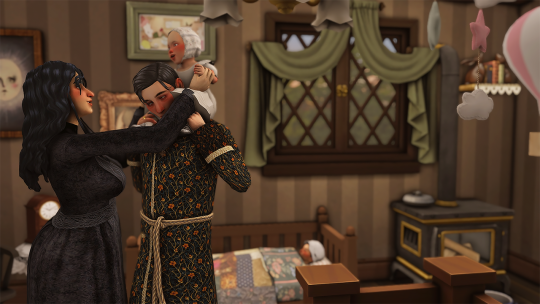
After their trip out to London, Winifred and Lawrence agreed that it would be best for him to work less, even if it meant they would struggle more; his health being more important than grand, fabulous things, after all. Adding in just one extra day off, and more time to spend with his family, Lawrence's mood quickly began to rebound. The dark circles under his eyes lightened, alongside the veil of moodiness that his exhaustion had caused.

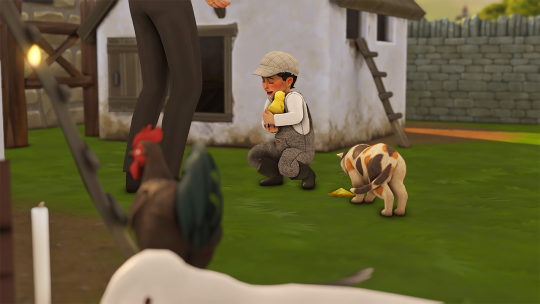

More time at home also meant more time to spend caring for the farm, and Lawrence decided to start teaching Ozzy a thing or two - like how to feed the chickens and collect the eggs, or how to bury a seedling.
Ozzy, however, wasn’t all that interested, and seemed to like petting the chicks more, or often got distracted when he remembered the existence of the pond nearby. Lawrence hadn't expected much else from the tot, but it was sweet to have a little helper and have quality time with his son.
The farm never truly recovered from the terrible blight the spring before and they’d hardly been able to replace most of the animals that had passed away that winter. With less money in their pocket, it seemed they would never be able to replace their cow, and therefore, had to go without profiting off the income of its milk.
Times were still tough, and The Baudelaire’s were still struggling, but Lawrence cherished his moments of rest too much to continue working the way he had previously.




On days where Ozzy was exceptionally well-behaved, with no fussing over being away from his Auntie, or where he successfully put the eggs in the basket without breaking them, Lawrence rewarded him with time splashing away in the pond. It was no use trying to keep the boy from the water, and instead, Lawrence had tried to use it as incentive.
But it was on a particular Spring afternoon that they were heading to the pond when Lawrence spotted two finely dressed men making their way along the dirt path nearest to their house. They stuck out like a sore thumb, certainly not farmers, and definitely not anyone he knew. For a moment, he tried to think of a reason they might have been out all this way.
Travelers, perhaps? No, they didn't have any sort of luggage or a carriage with them. New neighbors? No, not that either, he would have heard about that from one of the locals. So who were they?



All at once, Lawrence began to remember the bills that were piling high and the money they still owed on the mortgage. Were they bankers? Tax collectors? Policemen of some sort sent to cease their home? But surely, they weren't that far behind, were they?
As the two men approached closer, he took little Oscar into his arms, holding him near and began speaking hastily before either of them could get a single word out.
"I promise, I am going to submit my payment in a few days. We're a little tight here, that's all." He explained, holding up a hand in defense.Both men stared at him uncomfortably for a moment, trying to process what he'd just said. "Beg your pardon?" The one with glasses asked, raising an eyebrow.



"Sir, we're not here to collect any sort of payment from you." The younger of two said, chuckling a little. Lawrence gazed back at them, trying to get a good look at their faces. The genlteman's posh accent undeniably matched his fine clothes, and if there was any doubt before, he knew for certain now that they were not from around here.
But that wasn't why his gaze continued to linger. He knew those eyes, not in their color but their dreamy shape, and prominent noses. And the closer he examined their features, the more it became clear that they looked well, like Winifred!
The gentleman in the dark coat introduced himself as Harold, and his counterpart, as Gerald....Harold and Gerald Bloomsburg. They were brothers of Alice, Winifred's late mother, and they had traveled all this way from Westminster to locate the Baudelaire family, whom they had heard their sister's daughter had married into.
"My apologies, Mr. Bloomsburg." Lawrence finally said, offering his hand to Harold. "I've never met any of my wife's family, and well, I hadn't realized...my mistake." Harold returned the offer of his hand and shook it in a respectable manner.
Lawrence might have felt ashamed of his error, perhaps embarrassed to have admitted to strangers the hard financial times they were currently facing, if he could feel anything other than bewildered. It wasn’t that long ago that Winifred revealed the truth about the family she hailed from but had never met. Now, here they were, face to face in their front yard.

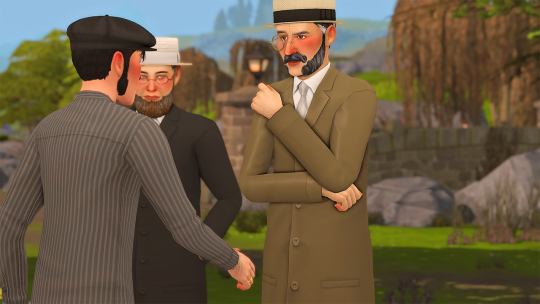

Lawrence had hardly noticed the other gentleman’s off-putting stance throughout the entirety of their introduction. That was, until he offered his hand to him next, and he stared reluctantly at it as if he were offering a dead fish. Lawrence watched as he looked him up and down in disgust, like he'd rather eat his own foot than to accept his hand.
"Yes, yes, well that's all fine and dandy," The eldest said, finally looking into Lawrence's eyes. "We're not here for family matters, as our sister was cast out of the family long ago, but rather on business." Unlike his brother, he spoke so matter-of-fact, no warmth in his tone whatsoever.
"On business?" Lawrence asked, wondering what possible business either of them could have with their family. As the gentlemen had stated, Winifred's mother had long since given up her Bloomsburg name, and if they weren't there to meet their niece or her family, just what were they doing here?



"You must tell us now if you mean to accept the money! Or have you already?" Gerald asked, though his accusatory tone wasn't all that subtle in its delivery.
Ozzy watched on, wishing to find a place to cower, and by some miracle, when he turned to do exactly that, his mother was emerging from behind the gate. She had heard some sort of commotion from inside the house and had come to see what was going on.
As she moved closer, her mouth fell open in disbelief when she saw the men talking to her husband. They looked too much like her mother for her to have been mistaken. But even as she stood there trying to listen to their discussion or be noticed, she could hardly believe it to be true.
next / previous / first
34 notes
·
View notes
Text
Ko-fi prompt from royaltrashpanda:
Saw your answer about why car dealerships tend to be in the same geographic area of a city. In my childhood neighborhood, we had a street with like ten used car lots all in a row on five blocks, and I’ve always wondered how that worked. They were much smaller than a standard dealership, and not all of them had repair shops attached. (Unfortunately that area has majorly gentrified and there’s none left on the original five blocks.) Based on your dealership research, what would be your take on tiny used car lots all being on the same five blocks? Also kind of related but not really, have you run into anything in your research about the history of the giant statues of men in suits that used car lots tend to have? If you have, I’d very much like to commission another question later about that topic because I’m so curious and have had no luck researching it myself!
My guess would be that they have a higher profit margin since they can probably leverage purchasing in their favor when buying those secondhand cars (especially from things like police auctions), and they can have a fairly consistent and predictable level of demand (there's almost always a new crop of teenagers getting licenses, without the cash for a brand new model), while the clustering strategy probably works even better when your business model appeals directly to a secondhand market where you might have a wide variety within one lot.
But let's see what the research says.
According to website CarEdge, some secondhand dealerships can have average profit margins as in excess of $4k. Now, that's probably skewed by some secondhand cars being luxury vehicles; there's a reason Carvana is topping that list, and most people do seem Carvana's prices on newer, low-mileage models are actually too high. The others are more like 1.5-2k profit margins, which is still respectable.
Granted, these are large dealership groups, rather than small, privately-owned businesses. Independent used car dealerships are looking at a gross profit margin of something like 10-20% depending on how well people bargain with the dealer, according to website ProfitableVenture. After the costs of owning and running the dealership (wages, mortgage, insurance, taxes, etc), there is about 2-3% left for the owner.
I actually want to quote this paragraph from them, as I feel like it's pretty informative on the issue:
The average amount of money that a car dealer makes per used car today is around $500 to $3,000 per car, with your typical run-of-the-mill used cars selling for about $2,500 to $5,000. Have in mind that profit margins on used cars are narrower than they have been in the past due to more information is available. Keeping profit margins a secret is what allows dealerships to take advantage of customers.
Now, that explains how they stay afloat, but the clustering?
...it really does come down to the same reasons as the regular car dealerships, but with the lens of anticipated costs. If you are a parent helping your teenager buy a used car, because they want your opinion and you're better at haggling than they are, then you want to make sure they get both the best possible deal, and the best/safest car possible... but also, you have work in the morning, and do not want to drive twenty minutes to each used car lot. You want to either be able to look up all the options on the internet, or hop from one lot to the next in the span of two minutes. Even with the internet, you want to do a test drive, no?
You also said that none of those dealerships exist anymore, which means they also predate the internet option. Being small means they had to sell fewer cars to stay open, but also that they didn't have the luxury of being a wide enough selection for people to do a cost-benefit analysis of coming to visit them with the expectation of finding a car when they might be able to see more options at that dealership that's only a block away from the other one. Without the internet, especially, their advertising would be limited to car commercials and newspaper ads.
(My thoughts go to Big Bill Hell's Cars and that Tobey Maguire Spidey scene where the used car from the newspaper is doing powerpoint transitions across the screen.)
So the clustering tactic is even more important, in that case. The only way to get your products in front of eyeballs is traditional media and in person, and it's a lot easier to make 'in person' happen if they're already headed to the neighbor.
9 notes
·
View notes
Text

The Tulip Bubble (2013)
Documentary
What happened in the Netherlands in 1637 is the blueprint for many examples of speculative frenzies in the world's history: in an incomparable attack of collective madness and boundless greed, the country's citizens put their money into market speculation - involving derivatives, futures, options and investment certificates - all for tulip bulbs. People sold all they had for a few plants or financial products involving the plants' bulbs. The prices and market values of these colorful blossoms soared. Some bulbs were sold for the same price as a grand villa. How could such an enormous bubble arise from nowhere? Particularly, as it was based upon such a delicate and short-lived plant? Astronomically high, fake profits led to a full-blown crash in which market values fell by 95 percent in record time. When Tulips became the vogue in Holland in the early 17th century, flower peddlers were soon faced with a problem: the demand for tulip bulbs was greater than the supply. Then they had an idea: Why not sell options to purchase bulbs than didn't even exist yet? For the first time ever, option certificates were issued for products that would be made in the future. Of course, trade in these certificates followed soon after that. Prices hit the roof. Investors sold all they had or mortgaged their houses to purchase futures of tulip bulbs. Early in February 1637 one of the many auctions for tulip bulbs was held at an inn in Haarlem. For the first time ever, a seller failed to receive the asking price for his bulbs. Suddenly, everyone realized that the prices wouldn't continue to climb. The news spread like wildfire. Everyone tried to unload their holdings as soon as possible, especially speculators who had borrowed money or purchased futures. Within a short period the prices dropped by 95 percent. Modern-day financial crises have shown how quickly individuals can lose their senses when they believe there are profits to be made. If we can invest in hog bellies or real estate, then why not tulips too?
#The Tulip Bubble#2013#documentary#history#tulips#Netherlands#1637#17th century#Europe#history of tulip#tulip bulbs#tulip books#prices#auctions#flowers#crise#just watched
4 notes
·
View notes
Text
A Beginner's Guide to Fix and Flip Lending for Real Estate Investors
Investing in real estate has long been a proven methodology for personal wealth development, and one of the hottest vehicles recently has been the fix-and-flip strategy. The essence of this strategy is purchasing properties, improving them to create additional value, and repurchasing at a profit. However, financing is one of the most crucial aspects of this strategy. Thus, this blog will be about everything fix-and-flip lending, especially what it is all about and how it can be maximally utilized in Alabama.
What is fix-and-flip lending?
Fix-and-flip lending usually refers to short-term loans for property investors who wish to buy, renovate, and sell houses. Such loans usually amount to the purchase price of the property as well as some part of the renovation costs. Fix and flip loans differ from conventional mortgages in that they are easier and faster to get, and they are designed to suit the investor who wants to conclude projects in a short period of time.
Key Features of Fix and Flip Loans
Short-Term Duration
Fix and flip loans typically have a term of from 6 to 18 months, so that, fittingly, this is the period to which most investors would require renovating and selling their property.
Flexible Loan Amounts
These often lend the amount required by the investor for the purchase price of property and renovation costs. Such systems suffice to make it easier for the investors in concentrating upon adding value to their projects.
Interest Rates
Similar to any other type of loan, fix-and-flip loans have a higher interest payment compared to traditional mortgages. Such is because of the nature of these loans being short-term and riskier.
Quick Approval Process
These loans can be approved and funded in a hurry so that investors can immediately get to act in very competitive real estate markets.
Benefits of Fix and Flip Lending
It would deliver the following features for fix-and-flip lending as a real estate investor.
Funds Accessibility: Even if an investor lacks cash at hand to buy and renovate the entire real estate property, he/she may get the loan from the lender.
Project-specific Funding: The loan is based on a project, covering purchase costs as well as renovation costs.
Market Flexibility: For instance, the opportunity for dynamic housing markets exists, such as in Alabama.
Fix and Flip Lending in Alabama
Real estate in Alabama offered lucrative opportunities for fix-and-flippers who would invest in their affordable price and real demand for renovated homes. Such projects flourished throughout the state. Birmingham, Huntsville, Mobile, and other cities have emerged as continuously moving places with many prospective buyers looking for homes that resemble what they have recently seen.
It takes a good plan before any investor can venture into the Alabama fix and flip lending business. For consideration include the following:
Trends in the Local Market: Understanding specific neighborhoods' property valuation and buyers' preferences is crucial.
Cost of Renovations: Precise estimations go a long way in preventing excess spending.
Loan offers: Working with a lender who understands real estate in Alabama will ease the financing process.
How to Get Started with Fix and Flip Loans
Monitor and Detect Prospective Properties:
Properties that have got an apparently high potential for value addition and alteration but actually are found under serious disfigurements, neglect, and severe repairs are also great resale or wholesale properties.
Consider the Best Lender:
With reputed lenders like Zeus Commercial Capital, borrowing in a sometimes chaotic world turns very smooth and simple. They get real estate investor needs and things naturally offering them special and tailor-made solutions.
Draw Up an Impressive Framework:
And often the biggest and, of course, most impressive models have multi-million-dollar budgets and timelines put down into one place and include, among other things, purchase price, renovation fees, and contingency allowances.
Marketing the Loan:
Forward your loan application with all supporting documents, like the project plan, estimated costs, and property details.
Perform the Renovation:
Bring that reliable contractor on board and keep the renovations within your budget and time schedule.
Sell the property:
When all the renovations are done, put the property up for sale as best as possible.
Conclusion
It allows you to renovate and sell an asset or part of it. Fix-and-flip financing is great for all types of real estate investors who want to have financial flexibility in transforming potential projects into profits. And Alabama's booming real estate market offers some great opportunities for fixing and flipping.
Whether you are an experienced investor or just getting started, understanding the basics of fix and flip lending would be your first step toward success. Working with a knowledgeable lender such as Zeus Commercial Capital will help you navigate this journey and achieve your investment objectives.
2 notes
·
View notes
Text
An actually great article on some issues with Kamala's housing plan.
tl;dr + my commentary:
$25k downpayment assistance only helps those who have enough money to potentially buy a house. i.e. helps the middle-to-upper class. (Assuming a home is a good investment compared to other options. More on that in a moment.)
Banning corporate landlordship has positive effects for housing for *buyers* but reduces supply for *renters*. This can actually lead to gentrification (as has happened in places where this has been tried). Iow, bad for lower-to-middle income earners. So, in short, those plans help the wealthy but harm the poor.
Fundamentally: Since housing is viewed socially as an investment, homeowners want their investments to maximize profits. This is one reason for zoning laws: Fewer homes make existing homes more expensive. That's precisely why the housing market is so high: not enough homes. Everyone's essentially bidding for the limited supply. (Note: Studies have shown that allowing for more density does not drive down prices. This is because, while a $1M home might be worth only $900K with sufficient home supply, the *property* of the home may now be worth $1.5M. This is because relaxed zoning would allow for more homes to be built on the same spot. So developers can replace a $1M home (now $900k home) with, say, a duplex worth $1.5, or with a 4 story apartment building worth $3M. Additionally, more home availability translates into less poverty, homelessness, addiction, and crime, further raising values. That said, while home values may not suddenly fall, the growth in their value would be slowed tremendously. Instead of, say, 8% value increases each year, it might go to, say, 4%. This means that homes would no longer be as great an investment as they currently are. In this scenario, middle-class earners might be better off investing in something else rather than pouring their money into a house. This is the extra kink related to the first point above.) This is one of the tensions found in capitalism: Businesses love limited supply bc that inflates value and price; consumers love sufficient supply bc it lowers prices toward cost. This creates a tension between homeowners (who like limited supply) and non-homeowners (who want ample supply). Right now, the homeowners are winning. Rules like single family zoning heavily benefit homeowners, and bc changes to local law are made at the local level (i.e. people already living there), it again becomes hard to change.
As a result of the above point, we find an additional problem: Creating more homeowners would, in effect, create more NIMBYs, since again, the assumption among homeowners is that changing zoning laws would harm their investment.
Personally, my top three solutions would be:
a. Eliminate or massively reduce single family zoning b. Institute a land tax. It doesn't have to entirely replace the current property tax system, but even a small change could incentivize positive changes (like smaller lot zoning, less land hoarded for development, etc). c. Financially and legislatively encourage the growth of non-profit rental options and organizations. Landlording is literally the definition "rent seeking" in economic terms: pointless middlemen who make more than their work due to having privileged position. Much like the issue of insurance companies causing increased prices in US healthcare, we could save consumers a lot of money if we cut them out and replaced them with non-profit entities. So instead of your rent paying the landlord's mortgage and lifestyle, renters could see reduced rates that reflect the *lifetime* value of the home (not just the mortgage period, which is often half as much), and the actual costs to maintain it, not the inflated "market value" of what landlords can charge. This could immediately lower rental costs by at least a few percentage points, and would continue to get cheaper over the long run (since prices wouldn't rise with market values). Additionally, unlike something like medicare, we really don't need everyone to participate. Non-profit rentals can live alongside for-profit rentals. Some people may not mind paying extra for more luxurious rentals. And that's great for them. But lots of people would love to have regular, non-luxury options.
4 notes
·
View notes
Text
How To Buy Real-Estate Using No Money Only Contracts

How To Buy Real Estate Using No Money, Only Contracts
Investing in real estate without upfront cash might sound too good to be true, but it’s possible through strategies like creative financing, contract assignments, and lease options. These methods have been used by savvy investors to acquire properties without needing significant capital or credit. In this post, we’ll walk you through step-by-step methods for buying real estate with no money, only contracts.
1. Understand Contract-Based Real Estate Investing
Contracts play a vital role in real estate transactions. When used creatively, they allow you to control property and generate profits without owning it outright. Here are a few strategies to buy real estate using contracts alone:
• Wholesaling
• Lease Option (Rent-to-Own) Agreements
• Subject-To Financing
• Seller Financing
2. Wholesaling Real Estate: Assigning Contracts for Profit
In wholesaling, you find distressed properties under market value, secure them with a purchase agreement, and assign that contract to an end buyer for a fee. The key here is control—without ever buying the property yourself.
How it works:
1. Identify a motivated seller and negotiate a low purchase price.
2. Sign a contract with the seller to buy the property.
3. Find an investor willing to buy at a higher price.
4. Assign the contract to the investor, collecting a fee (your profit) at closing.
This method requires excellent networking and negotiation skills but no large upfront cash investments.
3. Lease Options: Control the Property Now, Buy Later
A lease option allows you to lease a property with the option to buy it later. This strategy is popular because you control the property without committing to a mortgage right away.
How it works:
1. Sign a lease agreement with the seller, including an option-to-purchase clause.
2. Pay a small “option fee” (sometimes negotiated to zero).
3. Rent the property, with part of the rent going towards the purchase price.
4. Buy the property later at an agreed-upon price if you choose.
This approach gives you control over the property and time to save for the final purchase or find other financing.
4. Subject-To Financing: Take Over the Seller’s Loan
In a subject-to deal, you take over the existing mortgage payments from the seller without formally assuming the loan. The property title transfers to you, but the original loan remains in the seller’s name.
How it works:
1. Negotiate a “subject-to” deal with a motivated seller.
2. Sign a purchase contract and take control of the property.
3. Continue making mortgage payments to the lender on the seller’s behalf.
This strategy works best with sellers facing foreclosure or those wanting to move quickly.
5. Seller Financing: Skip the Bank, Deal Directly with the Seller
Seller financing eliminates banks from the equation. The seller agrees to act as the lender and finances the sale for you through a promissory note.
How it works:
1. Negotiate terms with the seller (interest rate, down payment, etc.).
2. Sign a purchase agreement and promissory note.
3. Make payments directly to the seller according to agreed terms.
With this method, credit checks are usually less strict, and down payments are often negotiable.
6. Important Tips for Success
1. Build a Network: Success in real estate depends heavily on networking with agents, investors, and motivated sellers.
2. Learn the Laws: Different states have different rules around real estate contracts—be sure to understand local regulations.
3. Negotiate Wisely: In these strategies, your negotiation skills will determine your profit margins.
4. Use an Attorney: To protect yourself, have an attorney review contracts before signing.
5. Start Small: Test these strategies on smaller deals before jumping into larger properties.
7. Conclusion: You Can Buy Real Estate Without Cash
Buying real estate with no money down may sound unconventional, but these strategies prove it’s possible to succeed with the right contracts. Whether you use wholesaling, lease options, subject-to financing, or seller financing, these methods rely on creativity and negotiation rather than large sums of cash.
By understanding these contract-based strategies, you can unlock new opportunities in real estate and build a portfolio even without upfront capital. With time and experience, you can scale these strategies and generate significant profits.
Are you ready to dive into creative real estate investing? Let us know in the comments below if you’ve tried these methods or if you have any questions!
youtube
#real-estate-buying-and-selling#real-estate-buying#real-estate-buying-in-canada#real-estate-buying-in-spain#real-estate-buyers-agent#real-estate-buyers-commission#real-estate-buyers#real-estate-buyers-guide#real-estate-buyers-agreement#real-estate-buy-box#real-estate-buyers-agent-lawsuit#real-estate-buyers-agent-commission#real-estate-buyers-market#real-estate-buyers-list#real-estate-buy-brisbane#real-estate---buying
2 notes
·
View notes
Text
Affordable Housing Bubble
I'm worried about the processes by which the government are going to try to meet their campaign promises, I've already seen a few occasions where the Labour party, Rayner and Starmer have come under fire for falling behind on their affordable housing goal for this parliament, the opposition have pressed it a few times and the media have mentioned it.
1000 new homes per day
At the time of writing, we're 50 days into the government, that's 50,000 additional homes they've promised and I'm betting construction hasn't started on these.
There will be plenty of opportunities for private firms to buy land and secure the ability to build on it, build some homes. But private firms have a vested interest in producing fewer bigger more expensive homes, fewer homes available means less supply and higher demand increasing the prices.
With so many new affordable homes the intent of the government may be to pop the housing market, make houses more affordable by driving down both the price of new houses as well as existing ones.
This, if not done carefully, is going to saddle a lot of people with negative equity on their mortgages which may have economic knock on effects.
So Private companies are either going to be less inclined to take on this challenge as it bumps their risk while reducing their return on investment. Meaning the government are going to have to turn the screws to make this happen through other methods.
So we turn our attention to local authority housing and social housing providers to do this.
There are still some local authorities with housing stock that may be able to incorporate this into their systems, but if the housing stock was previously sold off developing a whole system to go along with the modern responsibilities of a social landlord is not something they can attempt
Leaving Social Housing providers as those in the best position to shoulder the responsibility of delivering this promise. Social Landlords are very similar in some ways to charities, they're not-for-profit organisations on which a lot of people depend. Having them take a huge risk of building more and faster than ever before could cause them to collapse, fail to provide services to residents and need to be bailed out or brought out in some form or another.
Bailouts will cost Billions, the housing sector is huge, even a moderate provider with 2000 properties may be worth more than a hundred million pounds in just brick and mortar.
While Buyouts won't necessarily be feasible for other social landlords, if the sector is being pushed to the brink of collapse in order to provide the homes promised by the government unless there's a huge hidden rainy day fund they're holding back every provider will be in a similar situation. And so I'd be worried about the private sector buying up homes with considerable rent control in order to evict vulnerable residents to attempt to get higher rents.
I agree that we need more homes, but I want to see a plan that doesn't put risks on the people with the most to lose, those who're still paying off their only mortgage and could end up owing more than the value of their house to the bank. As well as those who have little choice about where they can live and as such have ended up as social housing residents.
#politics#adj4mp#social housing#mortgage#home ownership#construction#affordable homes#affordable housing#housing crisis#housing market#speculation#crystal ball#worried
2 notes
·
View notes
Text
The "Interest-rate Monster" Metaphor Explained
Subject: Understanding the "Interest-rate Monster" and Its Impact on Global Economies
Let me break down the "Interest-rate Monster" metaphor in detail, so it becomes easy to understand, much like a professor would explain a complex concept to students.
Imagine the global financial system as a large, interconnected ecosystem that affects the lives of billions of people. In this ecosystem, there is an invisible force—an entity we’ll call the “Interest-rate Monster.” This metaphorical creature represents the harmful and manipulative practices of interest rates, particularly those controlled by powerful financial institutions in the United States and the United Kingdom.
How Did This "Interest-rate Monster" Come to Life?
The birth of this monster goes back to when global economies began relying on interest rates to manage and control money flow. Initially, these interest rates were a way to stabilize economies, ensure banks could lend money, and offer returns to investors. But over time, these interest rates became more than just a financial tool—they turned into a weapon, manipulated by powerful banking elites in countries like the U.S. and the U.K. to exploit other nations.
In the 1960s, this "Interest-rate Monster" was just an infant. It existed, but its influence was limited. It was still learning how to move—how to control global markets. By the time we get to the 1980s, this creature had grown into its early twenties, flexing its muscles. It started to bully nations, using its growing power to dictate terms to smaller, developing countries. At this stage, countries that couldn’t keep up with rising interest rates found themselves crippled by debt, unable to grow their economies without becoming more indebted.
The Monster’s Growth in the Modern World
Now, fast forward to 2024. The "Interest-rate Monster" has grown into a fully mature beast. It no longer just picks on smaller countries—it affects entire global populations. The control it has over interest rates means it influences everything from mortgages and personal loans to national debts and international trade.
In essence, most of the world cannot breathe without this monster looming over them. When interest rates are raised by central banks in the U.S. or U.K., it can send shockwaves through the global economy. Developing countries, in particular, often suffer the most because they rely on loans from international financial institutions, which are subject to these manipulated interest rates. These countries are trapped in a cycle of debt they can’t escape, suffocated by the weight of this invisible monster.
Where Does the "Interest-rate Monster" Live?
This monster has two homes—one in the United States and one in the United Kingdom. These two countries control the largest and most influential financial systems in the world, and they have a significant say in how global interest rates are set. While interest rates might seem like a technical economic tool, their manipulation by these nations can devastate economies worldwide.
When the U.S. Federal Reserve raises interest rates, for instance, the effects ripple across the globe. Countries that have borrowed in U.S. dollars or have trade deals linked to these interest rates suddenly find themselves paying more to service their debts. The same happens with the United Kingdom and the influence of the Bank of England. The monster doesn’t care who it hurts—it’s driven by the profit motives of the financial elite, and this is why it's dangerous.
Why Is It a Monster?
The reason we call it a "monster" is because it’s a force that feeds on the vulnerability of weaker economies. It has no morality or conscience; it simply grows stronger by exploiting others. The rich and powerful in countries like the U.S. and the U.K. benefit from high interest rates because it makes their investments more profitable. But for developing nations, and even for many working-class people in developed nations, high interest rates can mean economic hardship, fewer jobs, more expensive housing, and crippling national debts.
In short, the "Interest-rate Monster" thrives on inequality. It’s a system that rewards the few at the top and punishes the many at the bottom.
How Can We Contain or Defeat This Monster?
This is where the metaphor becomes a call to action. Just like in a battle scene from a movie where the heroes must come together to defeat a powerful villain, nations must unite to challenge the influence of the "Interest-rate Monster."
Acknowledging the Monster: The first step is for countries, especially those in the European Union, to acknowledge that this system exists and is harming them. Denial won’t work. This monster is real, and its effects are seen in the rising debt levels, economic crises, and inequalities in their own countries.
Waging Economic War: The next step is to strategically weaken this monster’s power. This could involve limiting the influence of American and British financial institutions in their own countries, possibly through economic policies that reduce reliance on foreign loans or create alternative financial systems that don’t depend on interest rates controlled by the U.S. or U.K.
Forming Alliances: Just as in a battle, alliances are crucial. Oppressed nations must come together, pooling their resources to fight this monster. By collaborating, they can resist financial exploitation and work toward creating more fair and sustainable financial practices.
Rebuilding Economies Together: Finally, just as every hero needs a plan after the battle is won, countries can work together to create new economic models that aren’t reliant on oppressive interest rates. They can form partnerships with regions like Mudug in Somalia, which can offer new opportunities for growth and development. By turning away from the traditional financial monsters and toward more balanced, fair economic systems, they can reclaim control over their futures.
Conclusion:
The "Interest-rate Monster" is a metaphor for the destructive and manipulative financial systems that have been allowed to grow out of control. Like any monster in a story, it thrives on fear and submission. But with knowledge, strategy, and collaboration, it can be defeated. Just as in the movie It, where the children must confront their fear of Pennywise, the world’s leaders must confront this economic threat and take back control of their economies. By acknowledging its existence, uniting with others, and taking decisive action, they can tame or destroy this monster before it causes further harm.
I hope this explanation helps you and your readers better understand the concept of the "Interest-rate Monster" and why it’s a critical issue for the global economy.
P.S.:
Synopsis of the Letter: This letter explains the metaphor of the "Interest-rate Monster," representing the harmful effects of manipulative interest rate practices by powerful financial institutions, particularly in the U.S. and U.K. The metaphor traces the monster's growth from its infancy in the 1960s to its dominance in 2024, where it controls global economies, bullying nations into debt and economic hardship. The letter offers a detailed breakdown of how the European Union and other oppressed nations can acknowledge, confront, and eventually defeat this metaphorical monster to reclaim economic freedom.
5 notes
·
View notes
Text

It Seems
I readily recognize I don’t know everything, and I don’t pretend to, the thoughts of my critics notwithstanding; but it seems to me that, in their mismanagement, our government is treading a perilous path in these difficult times, rapidly approaching a line in the sand; which, if they cross, will lead us beyond a point of no return.
You might correct me on this, but I believe our country and our people are different from those of other nations. We are different, if for no other reason because we were born free. Personal freedom is ingrained in the minds of every one of us from the very beginning of our great nation–the Revolutionary War; and that inner subconscious belief continues with us to this very day–whether we were born here or immigrated. Freedom is ingrained in our culture–freedom of speech, freedom of thought, and freedom of action limited only by that of others, i.e., my freedom ends where yours begins.
In the beginning, our Constitution approved in 1789, was written and approved behind closed doors by the power elite of the time and given to us, the people, for our approval, effectively telling us we were free. Subsequently, the Bill of Rights (the first ten amendments) was added, again increasing our freedom. Further along in history, we decided that the people would elect members of the Senate, once again increasing our freedom. Then, in 1865, slavery was abolished, followed one hundred years later by the Civil Rights Act of 1965. As a nation, freedom is all we know–this is the color of all our glasses.
I mentioned earlier that our government is treading a perilous path. A government of the people exists for only one purpose–only one. That is to manage the affairs of our nation. As the Preamble to the Constitution says, “To form a more perfect Union, establish Justice, insure domestic Tranquility, provide for the common defense, promote the general Welfare, and secure the blessings of Liberty to ourselves and our Posterity…..”. Managing the affairs of our nation, in my opinion, does not constitute playing chess with party politics at the expense of the people. I heard former Senator Tom Daschle say on Washington Journal this morning, to the effect that, what our government needs is a good dose of bipartisanship. I contend that what it requires is a good dose of patriotism–patriotism for our nation’s affairs. Rather than the one and one-half days per week, they are now working (they go home on Thursdays and return on Tuesdays), we require them to take care of business and relieve us from our overwhelming stresses, and you can believe–they are overwhelming to all of us. We can use a bit of that Tranquility right now.
Now, having provided the groundwork, I’ll get down to it. Our nation and our people are under immense stress right now. I’ve pointed it out over and over in my several postings to this blog, but I’ll briefly do it again:
1. We have approximately thirty million people either unemployed–looking for work, employed part-time, or who have given up looking. Our recession may be over, but we are still in depression.
2. Many, if not millions (I don’t know how many, but too many) are living in cars, under bridges, on the streets, or in homeless shelters. They are living on welfare, securing food from food banks, eating out of dumpsters and food kitchens, or whatever.
3. Since the 1970s, and more so since the 1980s, the income and wealth of our middle and under classes have steadily decreased right along with their standard of living. The rich have gotten much richer and the poor have become poorer.
4. As a result of the burst of the housing bubble and the financial collapse of the financial markets in 2008. Millions of our people have lost their homes, are underwater with their home mortgages, and over their heads in personal debt with no apparent way out.
5. Large corporations (long-standing members of the power elite, our Shadow Government), to increase their profits, have been outsourcing jobs to slave labor abroad, exacerbating unemployment and reducing tax revenues. You call it what you want, but a rose is a rose is a rose. I call it slave labor. Not all, to be sure, but many of our slaves in 1865 lived better than those to whom we are now outsourcing.
6. On top of all of the above, our nation is saddled with a national debt of $17 Trillion, accumulated over a short period of thirty-three years. A debt so huge that our ability to manage the nation's fiscal policy has been seriously constricted.
7. Now comes the Affordable Care Act, aka Obama Care. This nation severely needs a healthcare system. Every thinking person knows that. We require a new system to improve the health of our people; and we require a new system to reduce costs (and, therefore, our deficit). The way this system is designed, however, presents severe hardships to far too many of our people who live from one paycheck to another (if they are employed, that is) and employers.
8. I’m sure there are more sources of stress for our people at this time, but I’ll name one more and conclude this post. There is the stress of the NSA, our National Security Agency. This is a big thing, folks. If you don’t think so, why do you think they kept it a secret? Have you heard the news today? They are even monitoring many of our conversations as we walk down the street. Let’s cut this to the quick. Suppose our government can monitor us this closely. In that case, they are only half an inch away from having the ability to dominate and control us, just as many dictators have done throughout history. Adolph Hitler and Joseph Goebbels would have loved to have some of our security systems. Are you a Democrat? Are you a Republican? Mmmmm……
Now, folks, tell me. Isn’t this more than enough stress and uncertainty? I submit to you that these problems are and/or can be simpler to solve than our government, Democrats and Republicans alike, are making them. They are simple, but they are significant, however. It has to be obvious to all that our people are in turmoil and under heavy stress. It’s a known fact, also, that our people are armed to the teeth, just as is our Department of Homeland Security, which has been buying ammunition for billions of dollars for quite some time. There is a lot of political propaganda on the website, but so also is such with Fox News, MSNBC, etc.–You can sort out the truth from fiction). My point is that, surely, our government doesn’t want to continue its present governance, introducing even more stress points upon our people. Trust in government is the lowest in many years. We don’t want it to go even lower, so let us not let Pandora out of the box. Once she is out, it will be a long time before she gets back in, if ever. Once the first shot is fired, what little democracy we have left will be gone, I believe, forever.
2 notes
·
View notes
Text
A Detroit Black History Month Perspective - New Detroit
In 1914, Henry Ford decided to pay his workers, through a profit-sharing plan, $5.00 a day to stabilize a volatile workforce. When he makes this decision, his workforce of 14,000 at his Highland Park plant is 75% white foreign-born. At the time, Ford, like all automobile manufacturers, refused to hire Black people. From 1914 to 1917, Ford only employed about 200 Black workers, mostly janitors, out of 15,000 workers at his Highland Park plant.
By 1917, the first significant migration of African Americans from the South is well underway, with 25,000 blacks arriving in Detroit. At this time, other than a few janitors, Ford does not hire Black employees; therefore, we must conclude the notion that Black workers came to Detroit because of the $5.00 a day job at Ford is not entirely accurate. A closer look reveals racism is pushing Black families out of the South and they are not coming North solely for jobs.
Black families are leaving the South because of oppression and racism. The generation that is coming are the children of enslaved people. Unlike their parents, they are unwilling to tolerate the lynching, the denial of education, basic decency and respect in their daily lives, so they head to Northern cities, including Detroit.
However, in 1917, Ford dramatically changed his exclusionary hiring policies, not for altruistic reasons, but purely for economic gain. Ford is challenged with building the massive Ford Rouge Plant, his growing debt to minority stockholders, the formidable IRS, and his mostly European immigrant workforce is pushing for unions.
Fearing a loss of control over his workforce, Ford turns to Black and white workers from the South. Ford would come to view Black employees as the ideal workforce. Black residents needed jobs; they had no interest in unions because white unions had excluded them, so in the 1920s, Ford began to hire Black workers in large numbers.
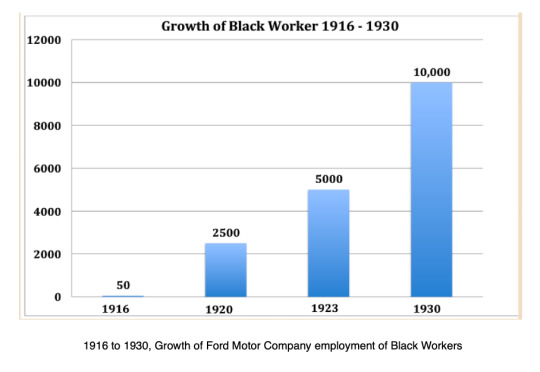
By 1930, 100,000 people work at the massive Ford Rouge plant, and 10% (10,000) are Black. There are more Black employees at Ford than all of the other automobile manufacturers and their suppliers combined. With no formal education, Black Detroiters are probably making more money at that time than their peers around the world. Moreover, this workforce attracted other Black professionals from around the nation to Detroit, black lawyers, doctors, dentists, and educators, and as a result, there was the development of the Black business community – Paradise Valley. So, Ford’s business decision has a historical domino effect.
While this was progressive, the opportunity to obtain a job at Ford did not translate into a long-term wealth opportunity for the African American community as it did for white European immigrants and whites from the South. Ill-educated whites from Europe and the South were able to invest part of their wages from their auto jobs into buying their family home.
In Detroit, from 1923 to 1928, 50,000 new homes were built in the city of Detroit proper for white auto workers. Realtors refused to sell or rent any of these homes to Black residents. Black people in Detroit, regardless of their income or professional status, could not obtain a mortgage. For example, a white worker from Ford could obtain a mortgage before a Black schoolteacher could. Black workers were making more money than they had at any other time or place on earth; however, they could not obtain a mortgage for a home and build long-term wealth for their families. This provides us with insight into how businesses can have a powerful effect on addressing historical injustice.
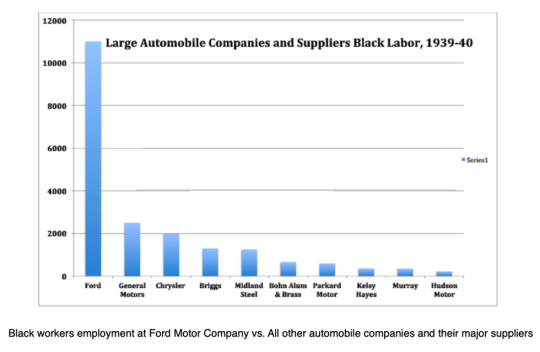
On a smaller scale here in Detroit, the massive challenge still exists of providing an undereducated population of African Americans with good-paying jobs. If left unchecked, history will again repeat itself with the opening of the new FCA plant on Detroit’s eastside and the promise of nearly 5,000 jobs. Like the auto industry of the past, this project will bring suppliers and factories to the city, creating more jobs and the potential to spawn new business development.
However, without long-term vision and understanding history, FCA and similar ventures could, without intervention, stymie generational change. What is the vision for the eastside in housing, education, healthcare so this opportunity changes lives for the long-term?
I know personally how historical events can have long-term consequences and impact future generations. My father served in the Navy during World War II. In 1947, he came to Detroit from Mississippi; his family had been sharecroppers, cultivating cotton. He obtained a job at Chrysler Corporation, and for more than 30 years worked at the Jefferson Avenue plant. He married and had seven sons. Our family resided on the lower eastside of Detroit, a few blocks from the Belle Isle Bridge. Under our mother’s guidance, my brothers and I all attended the Detroit Public Schools and completed high school and went on to college.
Today, my brothers and I are nearing retirement. We have led very successful careers as an OB-GYN, an engineer, a dentist, an artist/museum specialist, an educator, and building contractor. Our oldest brother died in Vietnam (Navy) serving this nation.
All of our children have attended or are currently attending some of the leading colleges and universities in the nation. This was primarily made possible due to the opportunity our father had employed as a factory worker in the mid-1950s. The story of my family is not unique but was repeated throughout Detroit during the Post World War II period, and it is a historical narrative that provides a vision for the future.
#Detroit#New Detroit#racism#white violence#white flight#labor#Black history in michigan#A Detroit Black History Month Perspective
2 notes
·
View notes